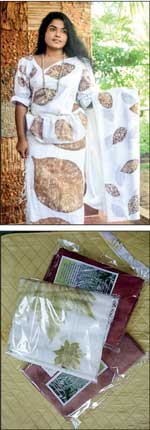Saturday Feb 21, 2026
Saturday Feb 21, 2026
Saturday, 1 January 2022 00:00 - - {{hitsCtrl.values.hits}}
 Social entrepreneurship is gaining traction in Sri Lanka slowly but steadily, with the goal of empowering individuals, families, and communities to engage in economic activities not solely for the sake of profit, but also out of a sense of responsibility for the society, its people, the environment, and the planet as a whole in which they operate.
Social entrepreneurship is gaining traction in Sri Lanka slowly but steadily, with the goal of empowering individuals, families, and communities to engage in economic activities not solely for the sake of profit, but also out of a sense of responsibility for the society, its people, the environment, and the planet as a whole in which they operate.
This is the primary distinction between the social enterprise and standard company models. As a result, all company activities are linked to a social mission and a commercial objective, with many companies contributing a portion of their revenues to organisations addressing social and environmental concerns. The normal business owner, on the other hand, may be unconcerned about allocating such a money.
Shiromi Pathirana is a young entrepreneur who has delved into a fresh and uncommon industry of creating clothing utilising natural colours without the use of chemicals. She is passionate about protecting nature and offering a helping hand to the underprivileged part of the community, which perfectly aligns her business activities with the social entrepreneurship concept.
The clothing colours are created entirely from natural flowers, roots, and barks. They are extracted by a laborious and time-consuming procedure that involves boiling, separation, and other operations. Natural resources are used to obtain the raw materials, inflicting no harm to the environment. For instance, the barks are collected not from tree removal or scraping, but rather from discarded wood used for purposes such as firewood. Additionally, flowers that are wasted after being used for worship in locations such as religious places are utilised extensively to produce colours.
Shiromi designs her own sarees, blouses, and other clothes. No two clothes are identical in design. Even a single piece takes a great deal of time and effort to create. They have the natural perfume of the flowers and plants and are marketed exclusively at Laksala, Odel and export markets. Additionally, she produces a children’s clothing line. They are dyed using natural substances such as tree-turmeric (wenivel) and do not contain any chemicals. The unique feature of these clothing is that they repel mosquitos and insects.
The ability to create natural colours is a self-taught skill acquired through the study of numerous publications. Additionally, Shiromi conducts research and has created 12 new colours to date. She has won numerous prizes at the national level for her work, frequently taking first place, since releasing her products in 2018 after years of experimentation. The most recent one is receiving first place in the small industry category at the Sirasa TV and NDB Bank-hosted ‘Wanithabimana’ awards in 2020.
She employs widows and disabled individuals. “They are the most despised segment of society. Nobody wants to employ them. I am overjoyed to be able to assist such folks by providing them with a means of subsistence,” Shiromi says. Additionally, facilities are provided for growing wet flowers that are required by homes, so assisting the less fortunate members of the community.
Shiromi initially entered this business as a hobby, not as a social initiative. Later, with the purpose of expanding, she joined hands with the British Council and the North Western (Wayamba) Province’s Industrial Services Bureau (ISB), under the European Union funded ‘Enterprise’ project, an organisation dedicated to empowering women and youth. These organisations have held numerous workshops on social entrepreneurship.
 Shiromi accepted the concept after learning about the potential benefits and was inspired to convert her venture into a social enterprise. She was effusive in her gratitude for the advice and assistance provided by the aforementioned two organisations in paving the way for her to evolve into what it is now, regarded as the country’s and world’s leading manufacturer of natural dyes. They had educated her on which areas and how to build the business to focus on, as well as identified the business’s flaws and gave other important inputs.
Shiromi accepted the concept after learning about the potential benefits and was inspired to convert her venture into a social enterprise. She was effusive in her gratitude for the advice and assistance provided by the aforementioned two organisations in paving the way for her to evolve into what it is now, regarded as the country’s and world’s leading manufacturer of natural dyes. They had educated her on which areas and how to build the business to focus on, as well as identified the business’s flaws and gave other important inputs.
Shiromi first wondered if her attempt would be fruitless, but as time went by, she realised the value of her business, since people are increasingly consuming and using natural items, even in apparel. Shiromi plans to make the natural yarn and dye it naturally under her supervision in order to present a completely new product and so contribute to society and the planet.
“By doing so, I hope to expand work options for rural women and encourage them to advance in their life, giving greater significance to the social entrepreneurship concept. I am very certain that I am capable of achieving my aim in the near future, and I want to do so,” Shiromi says optimistically.
She urges everyone to pay attention to unique industries like these that are rapidly disappearing from the world. These natural notions have been practiced since the time of the Buddha, when monks’ robes were made from natural yarn and dyed. These sectors, which are steeped in heritage, should be safeguarded for the future.
“I wish that any private, public, or international body will step forward to assist me in my workout. I’m finding it difficult to find a market for these things. We import robes for monks but have the capability to manufacture them in our country. I am confident that I am capable of doing so and am willing to confront any obstacle. Therefore, if anyone could assist me, I could give more to the country and the world by advancing the social entrepreneurship concept,” she says.
Thus, the social enterprise concept has made a significant contribution to empowering women and youth in this country, both in terms of running a profitable business and giving back to the community. Its extension would certainly benefit the entire country.